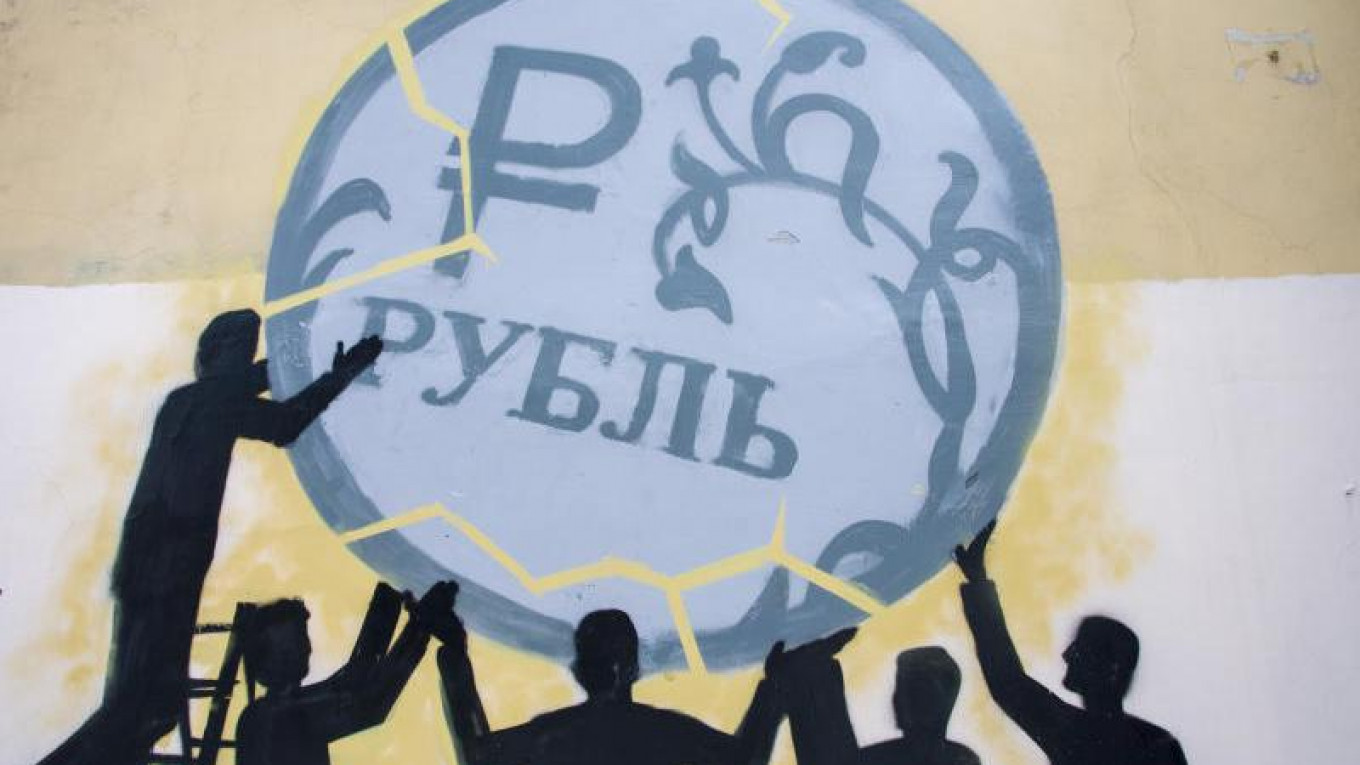On April 25, Russian President Vladimir Putin publicly backed the Central Bank’s November 2014 decision to float the ruble. This policy leaves the currency’s value at the mercy of market forces, which currently are conspiring to push the ruble higher vis-a-vis the dollar.
Combined with low oil prices, that trend threatens the government’s ability to balance its budget.
The ruble has experienced a steady appreciation against the dollar over the past six months. At the end of November, it was valued at about 60 rubles to the dollar. By the end of March, it had strengthened to around 55 rubles. Meanwhile, oil prices are again dropping after climbing above the $50-per-barrel mark, putting additional pressure on the state budget.
A rising ruble may be a concern for the government down the line — especially if oil prices fall far below $50, the minimum Russia needs for a balanced budget.
Putin said the main concern for the government is maintaining a stable currency.
An appreciating ruble causes problems not only for the government’s budget, but for business as well. Export-oriented firms benefit from a weaker ruble, as their foreign currency revenues are stronger at home. If the ruble’s growth were to continue unchecked, it would actually harm Russia’s economy, which is heavily dependent on oil exports.
“The current strength of the ruble is one of the main factors slowing growth in export industries and boosting imports, which has a negative impact on growth,” says Rodion Lomivorotov, senior economist at Sberbank CIB. Households and the retail segment of the economy benefit from the currency appreciation, but “this trend is not sustainable,” he said.
There seems little immediate prospect that the Russian government will return to currency pegging. “Non-market” efforts to regulate the currency would jeopardize stability, Putin was quoted as saying by the TASS news agency.
“We are not prepared to abandon [free floating the ruble], I want that to be clear,” he said.
Still, the authorities are trying to address business worries. The government and the Central Bank constantly discuss market-based means to control the ruble’s growth. Buying and selling foreign currencies is one way to do this. Last month, the Finance Ministry announced it would buy up to 69.9 billion rubles ($1.2 billion) worth of U.S. dollars by May 5th.
In the medium term most economists expect the ruble to correct, reaching 62-63 to the dollar later the year.
Until then, foreigners in Moscow will need to make adjustments. A strong ruble most obviously benefits those whose salaries are paid in rubles — though not entirely. It is unlikely a stronger ruble will lead to many price decreases in Russia. Meanwhile, those who earn money in foreign currencies are at a clear disadvantage, as their income will be worth less in ruble terms.
“Looking at the euro to ruble exchange rate, I am a little nervous about the recent comeback,” one foreign teacher working in Moscow tells The Moscow Times. “But since I was working a different job paying me in rubles during the 2014 crash, and I lost half my dollar salary, I am trying to keep everything in perspective now.”
A Message from The Moscow Times:
Dear readers,
We are facing unprecedented challenges. Russia's Prosecutor General's Office has designated The Moscow Times as an "undesirable" organization, criminalizing our work and putting our staff at risk of prosecution. This follows our earlier unjust labeling as a "foreign agent."
These actions are direct attempts to silence independent journalism in Russia. The authorities claim our work "discredits the decisions of the Russian leadership." We see things differently: we strive to provide accurate, unbiased reporting on Russia.
We, the journalists of The Moscow Times, refuse to be silenced. But to continue our work, we need your help.
Your support, no matter how small, makes a world of difference. If you can, please support us monthly starting from just $2. It's quick to set up, and every contribution makes a significant impact.
By supporting The Moscow Times, you're defending open, independent journalism in the face of repression. Thank you for standing with us.
Remind me later.






